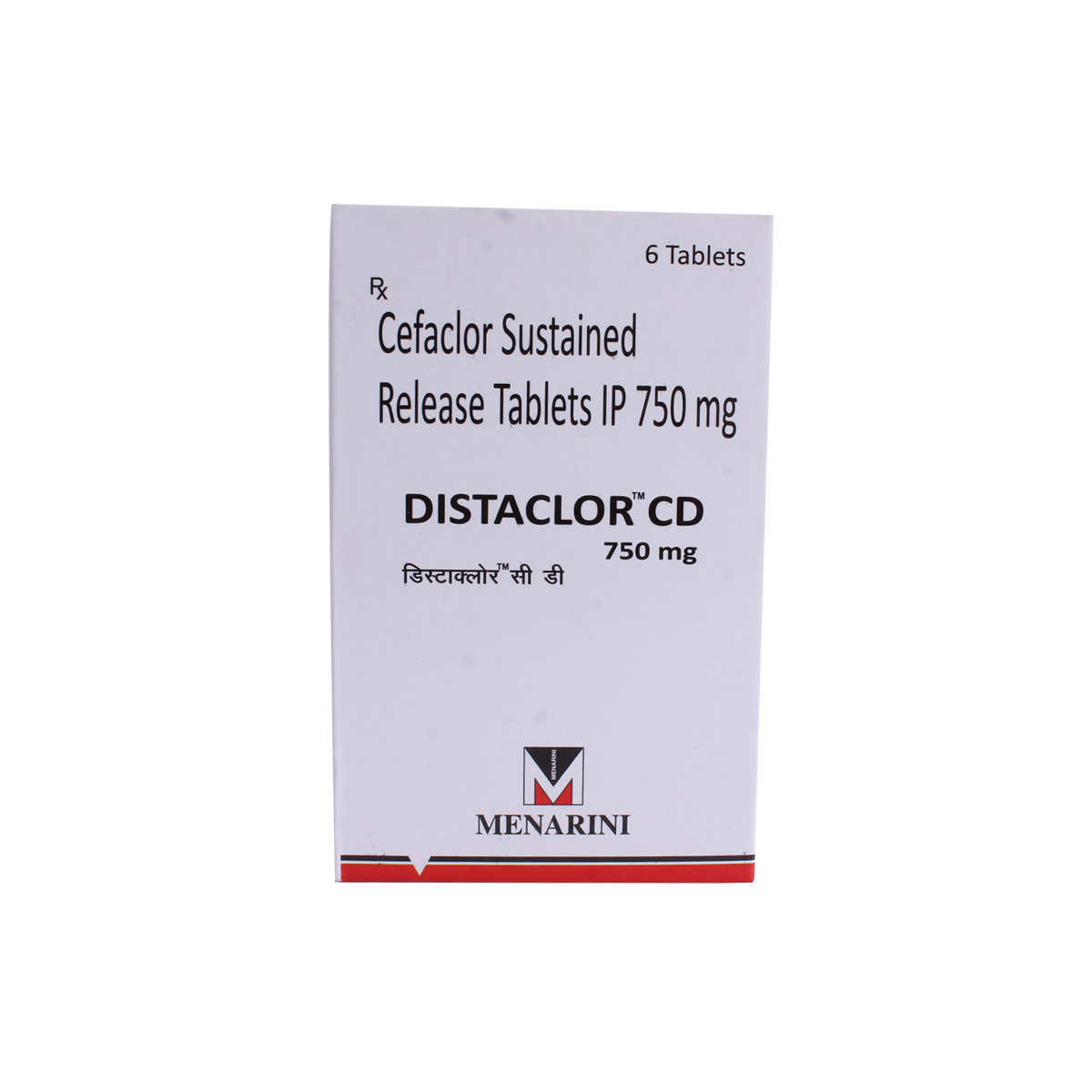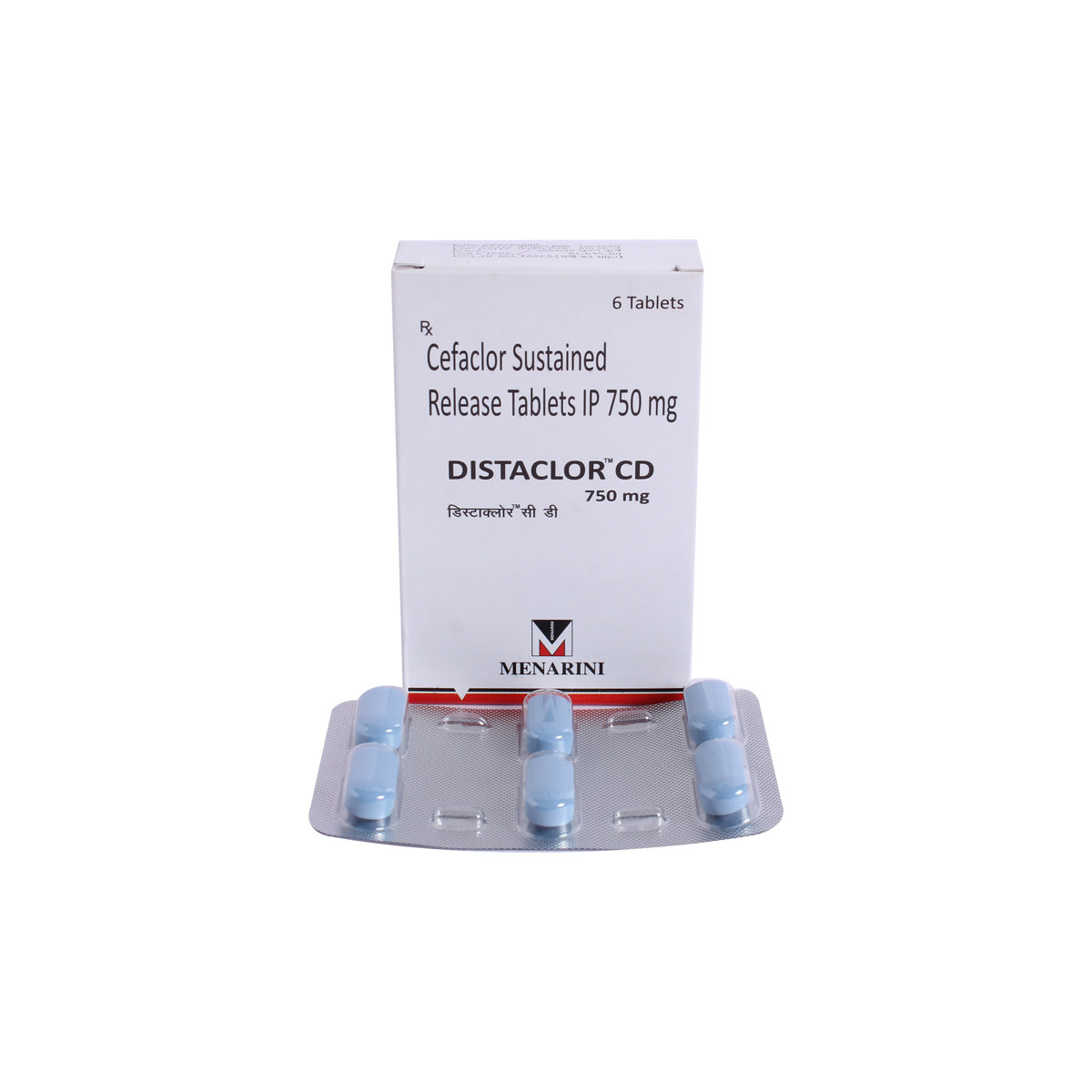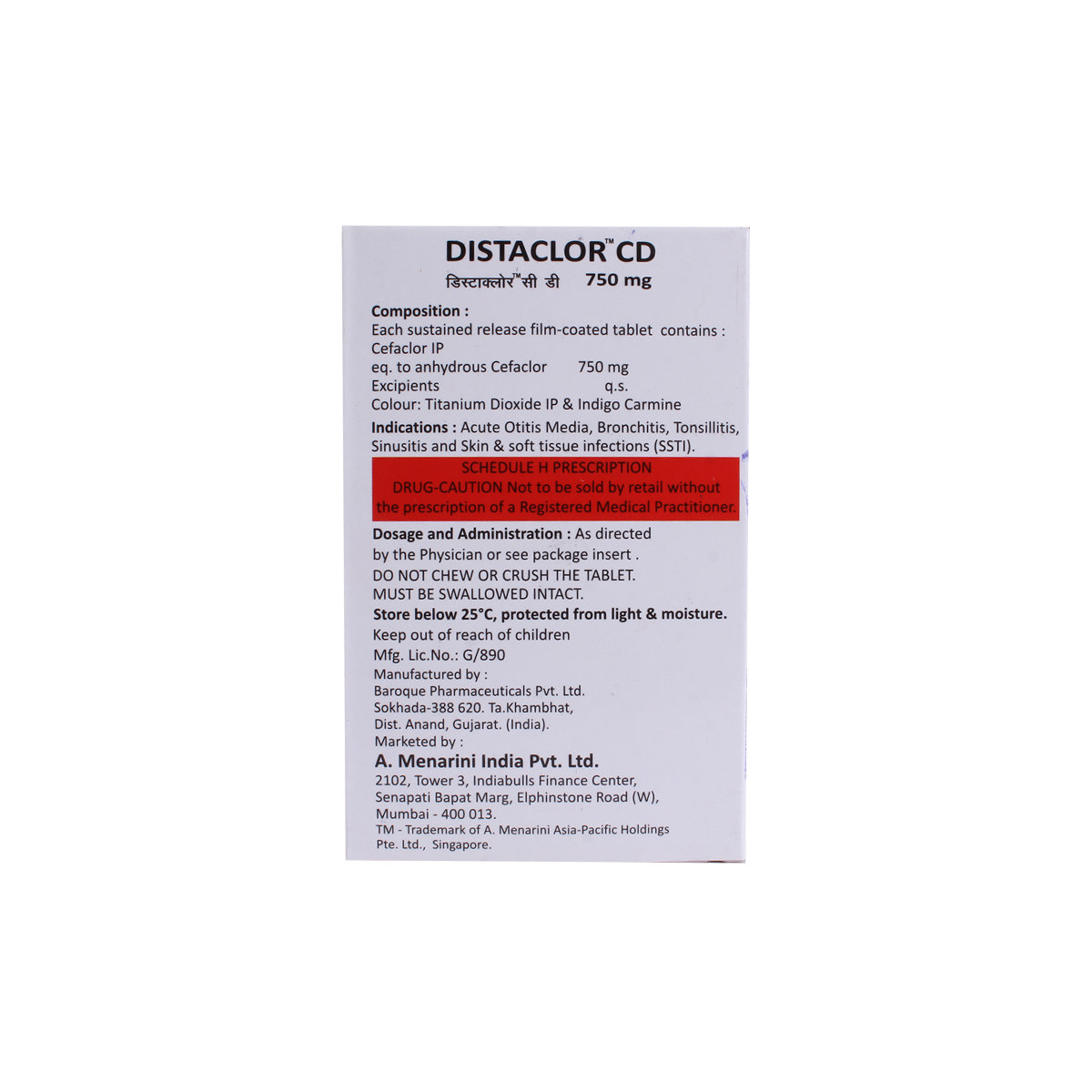Distaclor CD 750 Tablet 6's




MRP ₹725
(Inclusive of all Taxes)
₹108.8 Cashback (15%)
Distaclor CD 750 Tablet belongs to the group of medications called antibiotics. It is used to treat several bacterial infections of the urinary tract, respiratory tract, ears, nose, throat, skin and soft tissue. This medication kills bacteria by disrupting the formation of their cell walls, causing them to burst and die, which helps clear the infection and alleviate symptoms. It may cause side effects such as vomiting, nausea, diarrhoea, vaginal itching, fever, and rash in some cases. Most of these side effects are temporary and gradually resolve over time. However, consult the doctor if you experience any of these symptoms persistently.
Know Your Delivery Time
Provide Delivery Location

Secure Payment

India's Most Trusted Pharmacy

Genuine Products
Composition :
Manufacturer/Marketer :
Consume Type :
Return Policy :
Expires on or after :
About Distaclor CD 750 Tablet
Distaclor CD 750 Tablet belongs to a class of drugs called antibiotics used to treat several bacterial infections of the urinary tract, respiratory tract, ears, nose, throat, skin and soft tissue. A bacterial infection is a condition in which harmful bacteria grow in the body and cause an infection. It can infect any part of the body and multiply very quickly. Distaclor CD 750 Tablet does not work against infections, flu or cold symptoms caused by the virus.
Distaclor CD 750 Tablet contains Cefaclor, an antibiotic that works by interfering with the formation of the bacterial cell wall (a protective covering) necessary for their survival. Thereby, it damages the bacterial cell wall and kills the bacterial cell. Thus, it prevents the growth of bacterial infection.
The dose and duration of Distaclor CD 750 Tablet can be determined by the doctor based on your medical condition. You may experience vomiting, nausea, diarrhoea, vaginal itching, fever, and rash in some cases. Most of these side effects of Distaclor CD 750 Tablet do not require medical attention and typically resolve on their own over time. However, if the side effects persist or worsen, please consult your doctor.
If you are allergic to Distaclor CD 750 Tablet, penicillins, or any other medications, please inform your doctor. If you are pregnant or breastfeeding, please inform your doctor before taking Distaclor CD 750 Tablet. Distaclor CD 750 Tablet in tablet form is not recommended for children, but syrup form may be used in children above 1 month only in doses as prescribed by a doctor. If you are on dialysis, inform your doctor before taking Distaclor CD 750 Tablet, and they will adjust the dose accordingly. Distaclor CD 750 Tablet may interact with certain tests, such as glucose (sugar) in urine, and give unusual results. Therefore, inform the doctor that you are using Distaclor CD 750 Tablet before undergoing any tests.
Uses of Distaclor CD 750 Tablet
Distaclor CD 750 Tablet is used to treat bacterial infections. The detailed uses of Distaclor CD 750 Tablet are as follows:
- Treats urinary tract infections (UTIs): Distaclor CD 750 Tablet helps eliminate bacteria causing bladder and kidney infections.
- Manages respiratory tract infections: It is effective in treating pneumonia and bronchitis by killing the bacteria that cause these infections.
- Treats ear infections: It is used to treat conditions like otitis media to relieve pain and inflammation.
- Relieves nasal and sinus infections: It helps clear bacterial infections of the nose and sinuses.
- Treats throat infections: It acts effectively against pharyngitis and tonsillitis, reducing sore throat and swelling.
- Manages skin and soft tissue infections: It is useful in treating cellulitis, boils, and other bacterial skin conditions.

Have a query?
Directions for Use
- Distaclor CD 750 Tablet can be taken with or without food, as advised by your doctor.
- Follow your doctor's instructions on the dosage and timing of this medication to ensure safety.
- Swallow Distaclor CD 750 Tablet as a whole with a glass of water.
- Do not crush, break, or chew it.
Medicinal Benefits
Distaclor CD 750 Tablet contains Cefaclor, a broad-spectrum antibiotic that acts against both aerobic (grow in the presence of oxygen) and anaerobic (grow in the absence of oxygen) gram-negative and gram-positive bacteria. It is used in the treatment of several bacterial infections of the urinary tract, respiratory tract, ears, nose, throat, skin, and soft tissue. Distaclor CD 750 Tablet interferes with the formation of the bacterial cell wall (a protective covering) necessary for their survival. Thereby, it damages the bacterial cell wall and kills the bacteria.
How Distaclor CD 750 Tablet Works
Storage
- Inform Your Doctor: Notify your doctor immediately about your diarrhoea symptoms. This allows them to adjust your medication or provide guidance on managing side effects.
- Stay Hydrated: Drink plenty of fluids to replace lost water and electrolytes. Choose water, clear broth, and electrolyte-rich drinks. Avoid carbonated or caffeinated beverages to effectively rehydrate your body.
- Follow a Bland Diet: Eat easy-to-digest foods to help firm up your stool and settle your stomach. Try incorporating bananas, rice, applesauce, toast, plain crackers, and boiled vegetables into your diet.
- Avoid Trigger Foods: Steer clear of foods that can worsen diarrhoea, such as spicy, fatty, or greasy foods, high-fibre foods, and dairy products (especially if you're lactose intolerant).
- Practice Good Hygiene: Maintain good hygiene to prevent the spread of infection. To stay healthy, wash your hands frequently, clean and disinfect surfaces regularly, and avoid exchanging personal belongings with others.
- Take Anti-Diarrheal Medications: If your doctor advises, anti-diarrheal medications such as loperamide might help manage diarrhoea symptoms. Always follow your doctor's directions.
- Keep track of your diarrhoea symptoms. If they don't get better or worse or are accompanied by severe stomach pain, blood, or dehydration signs (like extreme thirst or dark urine), seek medical help.
- Inform your doctor about the nausea and discuss possible alternatives to the medication or adjustments to the dosage.
- Divide your daily food intake into smaller, more frequent meals to reduce nausea.
- Opt for bland, easily digestible foods like crackers, toast, plain rice, bananas, and applesauce.
- Avoid certain foods that can trigger nausea, such as fatty, greasy, spicy, and smelly foods.
- Drink plenty of fluids, such as water, clear broth, or electrolyte-rich beverages like coconut water or sports drinks.
- Use ginger (tea, ale, or candies) to help relieve nausea.
- Get adequate rest and also avoid strenuous activities that can worsen nausea.
- Talk to your doctor about taking anti-nausea medication if your nausea is severe.
- Record when your nausea occurs, what triggers it, and what provides relief to help you identify patterns and manage your symptoms more effectively.
- Preventing Vomiting (Before it Happens)
- Take medication exactly as prescribed by your doctor. This can help minimize side effects, including vomiting.
- Having a small meal before taking your medication can help reduce nausea and vomiting.
- Talk to your doctor about taking anti-nausea medication along with your prescribed medication.
- Managing Vomiting (If it Happens)
- Try taking ginger in the form of tea, ale, or candy to help alleviate nausea and vomiting.
- What to Do if Vomiting Persists
- Consult your doctor if vomiting continues or worsens, consult the doctor for guidance on adjusting your medication or additional treatment.
- Take medications with food (if recommended): It can help prevent stomach distress and indigestion.
- Eat smaller, more frequent meals: Divide daily food intake into smaller, more frequent meals to ease digestion.
- Avoid trigger foods: Identify and avoid foods that trigger indigestion, such as spicy, fatty, or acidic foods.
- Stay upright after eating: Sit or stand upright for at least 1-2 hours after eating to prevent stomach acid from flowing into the oesophagus.
- Avoid carbonated drinks: Avoid drinking carbonated beverages, such as soda or beer, which can worsen indigestion.
- Manage stress: To alleviate indigestion, engage in stress-reducing activities like deep breathing exercises or meditation.
- Consult a doctor if needed: If indigestion worsens or persists, consult a healthcare professional to adjust the medication regimen or explore alternative treatments.
- Skin rash caused by allergies is due to irritants or allergens. Therefore, avoid contact with such irritants.
- Consult your doctor for proper medication and apply an anti-itch medication. Follow the schedule and use the medication whenever needed.
- Protect your skin from extreme heat and try to apply wet compresses.
- Soak in the cool bath, which gives a soothing impact to the affected area.
- Avoid trigger foods that can cause allergic reactions, such as nuts, shellfish, or dairy products.
- Keep a food diary to track potential food allergens.
- Include omega-3 rich foods like salmon and walnuts to reduce inflammation.
- Wear loose, comfortable clothing made from soft fabrics like cotton.
- Apply cool compresses or take cool baths to reduce itching.
- Use gentle soaps and avoid harsh skin products.
- Reduce stress through relaxation techniques like meditation or deep breathing.
- Report the itching to your doctor immediately; they may need to change your medication or dosage.
- Use a cool, damp cloth on the itchy area to help soothe and calm the skin, reducing itching and inflammation.
- Keep your skin hydrated and healthy with gentle, fragrance-free moisturizers.
- Try not to scratch, as this can worsen the itching and irritate your skin.
- If your doctor prescribes, you can take oral medications or apply topical creams or ointments to help relieve itching.
- Track your itching symptoms and follow your doctor's guidance to adjust your treatment plan if needed. If the itching persists, consult your doctor for further advice.
What if I have taken an overdose of Distaclor CD 750 Tablet
Drug Warnings
If you are allergic to Distaclor CD 750 Tablet, penicillins, or any other medications, please inform your doctor. If you have kidney problems, diabetes, or a stomach or intestinal disorder, such as inflammation of the large intestine, tell your doctor before taking Distaclor CD 750 Tablet. If you are pregnant or breastfeeding, please inform your doctor before taking Distaclor CD 750 Tablet. Distaclor CD 750 Tablet in tablet form is not recommended for children, but syrup form may be used in children above 1 month only in doses as prescribed by a doctor. If you are on dialysis, inform your doctor before taking Distaclor CD 750 Tablet so that the dose may be reduced accordingly. Distaclor CD 750 Tablet may interact with certain tests, such as glucose (sugar) in urine, and give unusual results. Therefore, inform the doctor that you are using Distaclor CD 750 Tablet before undergoing any tests. You are recommended to complete the full course of Distaclor CD 750 Tablet as prescribed by your doctor for effective results.
Drug-Drug Interactions
Drug-Drug Interactions
Login/Sign Up
Drug-Food Interactions
Drug-Food Interactions
Login/Sign Up
Diet & Lifestyle Advise
- Take probiotics after completing the full course of Distaclor CD 750 Tablet to restore some healthy bacteria in the intestines that may have been killed. Taking probiotics after antibiotic treatment can reduce the risk of antibiotic-associated diarrhoea. Certain fermented foods like cheese, yogurt, kombucha, sauerkraut, and kimchi can restore the good bacteria of the intestine.
- Include fibre-rich foods, as they can be easily digested by your gut bacteria, which helps stimulate their growth. Thus, fibre-rich foods may help restore healthy gut bacteria after a course of antibiotics. Whole grains such as whole-grain bread and brown rice should be included in your diet.
- Make sure you drink plenty of water or other fluids every day while you are taking Distaclor CD 750 Tablet.
- Avoid alcohol consumption as it may increase adverse effects.
Habit Forming
Therapeutic Class
All Substitutes & Brand Comparisons
Alcohol
Caution
Avoid consumption of alcohol with Distaclor CD 750 Tablet as it may increase the risk of adverse effects.
Pregnancy
Caution
Distaclor CD 750 Tablet is a category B pregnancy drug and is given to pregnant women only if the doctor thinks the benefits outweigh the risks. Please consult a doctor if you are pregnant or planning to become pregnant.
Breast Feeding
Consult your doctor
Distaclor CD 750 Tablet may be excreted in small amounts into breast milk. It should be used during breastfeeding only if clearly recommended by your doctor, after carefully assessing the potential benefits and risks.
Driving
Safe
Distaclor CD 750 Tablet usually does not affect your ability to drive or operate machinery.
Liver
Caution
Take Distaclor CD 750 Tablet with caution, especially if you have a history of Liver diseases/conditions. The dose may be adjusted by your doctor as required.
Kidney
Caution
Take Distaclor CD 750 Tablet with caution, especially if you have a history of Kidney diseases/conditions. The dose may be adjusted by your doctor as required.
Children
Caution
Distaclor CD 750 Tablet is not recommended for children. Please consult the doctor if you have any concerns regarding this.
FAQs
Distaclor CD 750 Tablet belongs to the class of antibiotics. It is used to treat several bacterial infections of the urinary tract, respiratory tract, ears, nose, throat, skin and soft tissue.
Distaclor CD 750 Tablet contains Cefaclor, an antibiotic that works by interfering with the formation of the bacterial cell wall (a protective covering) that is necessary for their survival. Thereby, it damages the bacterial cell wall and kills bacteria.
Yes, Distaclor CD 750 Tablet may be used to treat a lung infection caused by bacteria. Distaclor CD 750 Tablet is an antibiotic that kills bacteria and prevents the spread of infection.
Distaclor CD 750 Tablet may cause diarrhoea as a common side effect. However, if the condition persists, worsens, or if you notice blood or mucus in stools, avoid taking Distaclor CD 750 Tablet and consult a doctor immediately.
Distaclor CD 750 Tablet should be used with caution in patients receiving dialysis (process of filtration and purification of blood using a machine). Therefore, if you are receiving dialysis, please inform your doctor before taking Distaclor CD 750 Tablet so that the dose may be adjusted accordingly.
You are not recommended to take Distaclor CD 750 Tablet with warfarin as co-administration of these two medicines may increase the risk of bleeding more easily. However, please consult your doctor before taking Distaclor CD 750 Tablet with other drugs.
No, Distaclor CD 750 Tablet is not used to treat viral infections. Distaclor CD 750 Tablet is an antibiotic which is used to treat only bacterial infections.
You are not recommended to stop taking Distaclor CD 750 Tablet without consulting your doctor, as it may worsen the infection or cause recurring symptoms. Therefore, take Distaclor CD 750 Tablet for as long as your doctor has prescribed it. If you experience any difficulty while taking Distaclor CD 750 Tablet, please consult your doctor.
Country of origin
Customers Also Bought
Disclaimer
Author Details
We provide you with authentic, trustworthy and relevant information
Buy best Infections & Infestation products by
Cipla Ltd
Macleods Pharmaceuticals Ltd
Alkem Laboratories Ltd
Lupin Ltd
Abbott India Ltd
Mankind Pharma Pvt Ltd
Sun Pharmaceutical Industries Ltd
Micro Labs Ltd
Aristo Pharmaceuticals Pvt Ltd
Intas Pharmaceuticals Ltd
FDC Ltd
Glenmark Pharmaceuticals Ltd
Ipca Laboratories Ltd
Zydus Healthcare Ltd
United Biotech Pvt Ltd
Torrent Pharmaceuticals Ltd
Emcure Pharmaceuticals Ltd
Leeford Healthcare Ltd
Zuventus Healthcare Ltd
Hetero Drugs Ltd
Biochem Pharmaceutical Industries Ltd
Dr Reddy's Laboratories Ltd
Fusion Health Care Pvt Ltd
Alembic Pharmaceuticals Ltd
Cadila Healthcare Ltd
Zydus Cadila
Indoco Remedies Ltd
Wockhardt Ltd
AAA Pharma Trade Pvt Ltd
Morepen Laboratories Ltd
Cadila Pharmaceuticals Ltd
Converge Biotech Pvt Ltd
GlaxoSmithKline Pharmaceuticals Ltd
Gufic Bioscience Ltd
Elder Pharmaceuticals Ltd
Blue Cross Laboratories Pvt Ltd
Capital Pharma
Hetero Healthcare Pvt Ltd
Alniche Life Sciences Pvt Ltd
Mylan Pharmaceuticals Pvt Ltd
Medishri Healthcare Pvt Ltd
Akumentis Healthcare Ltd
Corona Remedies Pvt Ltd
Apex Laboratories Pvt Ltd
Pfizer Ltd
Vasu Organics Pvt Ltd
Wallace Pharmaceuticals Pvt Ltd
Veritaz Healthcare Ltd
Samarth Life Sciences Pvt Ltd
Koye Pharmaceuticals Pvt Ltd
Unifaith Biotech Pvt Ltd
Laborate Pharmaceuticals India Ltd
Hegde & Hegde Pharmaceutica Llp
Overseas Health Care Pvt Ltd
Shreya Life Sciences Pvt Ltd
Canixa Life Sciences Pvt Ltd
East West Pharma India Pvt Ltd
Lincoln Pharmaceuticals Ltd
Ranbaxy Laboratories Ltd
Biocon Ltd
Klm Laboratories Pvt Ltd
Natco Pharma Ltd
Zymes Bioscience Pvt Ltd
Biochemix Health Care Pvt Ltd
Medley Pharmaceuticals Ltd
Pristine Pearl Pharma Pvt Ltd
Ajanta Pharma Ltd
Allites Life Sciences Pvt Ltd
Indchemie Health Specialities Pvt Ltd
Brinton Pharmaceuticals Ltd
German Remedies Ltd
J B Chemicals & Pharmaceuticals Ltd
Neon Laboratories Ltd
Unichem International
Yuventis Pharmaceuticals
Aurz Pharmaceutical Pvt Ltd
Unipark Biotech Pvt Ltd
Celon Laboratories Pvt Ltd
DR Johns Lab Pharma Pvt Ltd
Icarus Health Care Pvt Ltd
Kivi Labs Ltd
La Renon Healthcare Pvt Ltd
Medgen Drugs And Laboratories Pvt Ltd
Megma Healthcare Pvt Ltd
Aequitas Healthcare Pvt Ltd
Aionios Pharma Pvt Ltd
BDR Pharmaceuticals Internationals Pvt Ltd
Kepler Healthcare Pvt Ltd
Indiabulls Pharmaceuticals Pvt Ltd
Suraksha Pharma Pvt Ltd
Concord Biotech Ltd
Fresenius Kabi India Pvt Ltd
Lividus Pharmaceuticals Pvt Ltd
Nicholas Piramal India Ltd
Novartis India Ltd
Zee Laboratories Ltd
Auspharma Pvt Ltd
Biological E Ltd
Intra Life Pvt Ltd
Knoll Healthcare Pvt Ltd






